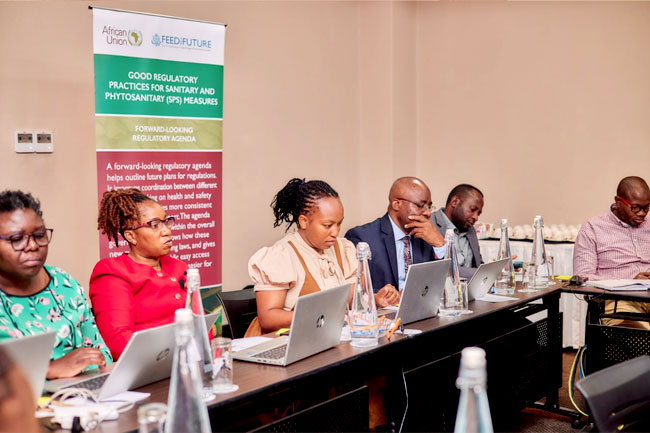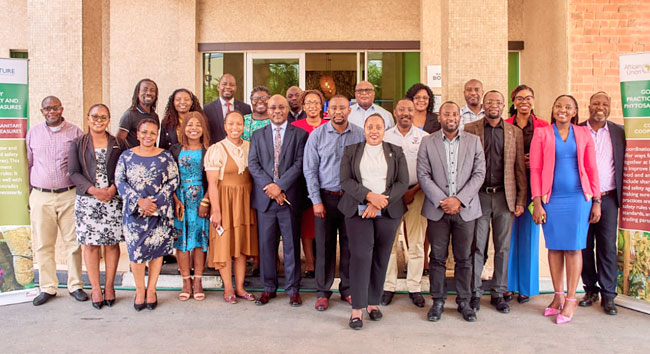
In partnership with the United States Department of Agriculture’s Foreign Agriculture Service and African Union, Dr. Nicola L. Ritter, Instructional Associate Professor in the department of Veterinary Integrative Sciences at Texas A&M University, hosted a one-week training event on good regulatory practices on sanitary and phytosanitary standards in Lusaka, Zambia, September 2024. In attendance, 27 public health officials from around the country. Officials from plant health, animal health, and food security participated in the forum to coordinate SPS measures.
The group pilot tested an innovative GRP SPS tool developed by the Center for Educational Technologies at Texas A&M University. This tool on Good Regulatory Practices (GRPs) to improve Sanitary and Phytosanitary (SPS) measures (GRP SPS Tool) was developed to assist the user in assessing current practices for developing, reviewing, or implementing as well as in identifying where current practices can be strengthened. It is designed to accompany and complement the publication Good Regulatory Practices to Improve SPS Measures: A Practical Guide (Practical Guide), prepared by the Standards and Trade Development Facility (STDF), a global partnership to facilitate safe trade and promote improved food safety, animal health, and plant health capacity in developing countries.

Zambia, as an emerging economy with a robust agricultural sector, plays a significant role in both regional and global food systems. With a growing demand for agricultural exports, particularly in the context of the African Continental Free Trade Area (AfCFTA), Zambia faces numerous opportunities and challenges. Among the most critical challenges is the implementation and evaluation of Sanitary and Phytosanitary (SPS) measures—standards related to food safety, animal and plant health—ensuring that Zambia’s agricultural products meet both domestic and international standards.

To maintain competitiveness in international markets while protecting public health and the environment, it is imperative that Zambia adopts good regulatory practices (GRPs) to evaluate SPS measures effectively. Let’s explore why such practices are crucial for Zambia’s agricultural and trade sectors.
1. Enhancing Food Safety and Public Health
The primary objective of SPS measures is to protect human, animal, and plant health from potential risks associated with agricultural products. For Zambia, where agriculture is a key sector contributing to employment and GDP, the adoption of effective SPS measures is essential for safeguarding public health.
Good regulatory practices provide a structured approach to evaluating SPS measures based on scientific evidence. By using sound risk assessments and cost-benefit analyses, Zambia can ensure that its food safety standards are not only effective but proportionate to the risks involved. This will help prevent the introduction of harmful pests, diseases, and contaminants, ultimately safeguarding consumer health both within the country and in international markets.
2. Promoting Trade and Access to Global Markets
One of Zambia’s key export commodities is agricultural produce—particularly crops such as maize, soybeans, tobacco, and horticultural products. Access to international markets often depends on the country’s ability to comply with stringent SPS standards set by trade partners. Adopting good regulatory practices in evaluating SPS measures ensures that Zambia meets the necessary requirements of trading partners, which can enhance market access and reduce trade barriers.
For example, the European Union, the United States, and South Africa have stringent food safety and phytosanitary standards that must be met by exporters. If Zambia can demonstrate that its SPS measures are based on sound scientific data and international best practices, it will be better positioned to negotiate favorable terms in trade agreements, secure more export opportunities, and enhance the credibility of its agricultural exports.
3. Avoiding Non-Tariff Barriers to Trade
Non-tariff barriers (NTBs), including excessive or unjustified SPS measures, can undermine trade by acting as hidden barriers to market entry. For Zambia, the implementation of poorly designed or overly restrictive SPS measures could result in disputes or rejection of exports, particularly in highly regulated markets.
By adopting good regulatory practices, Zambia can ensure that its SPS measures are transparent, justifiable, and aligned with international standards such as those set by the World Trade Organization (WTO) and the International Plant Protection Convention (IPPC). This would help avoid trade disputes and prevent the imposition of unnecessary NTBs on Zambia’s exports, facilitating smoother access to global markets.
4. Ensuring Cost-Effectiveness and Sustainability
While it is important to implement effective SPS measures to protect public health, the costs associated with these measures should be carefully considered. Unnecessarily stringent or burdensome regulations can be expensive to implement and may disproportionately impact smallholder farmers, who make up the majority of Zambia’s agricultural sector.
By utilizing good regulatory practices, Zambia can undertake cost-benefit analysis to ensure that SPS measures are not only scientifically justified but also cost-effective. These evaluations can ensure that regulatory measures strike the right balance between achieving public health goals and minimizing economic impact on the agricultural sector. This approach can contribute to the sustainability of Zambia’s agricultural industry, ensuring that producers can continue to meet both domestic and international demand without being burdened by excessive regulatory costs.
5. Promoting Transparency and Accountability
Good regulatory practices in evaluating SPS measures also foster transparency and accountability. Through clear consultation processes, engagement with stakeholders (such as farmers, exporters, scientists, and consumer groups), and regular reviews of the measures, Zambia can ensure that its SPS regulations are fair and evidence-based.
Transparency in the formulation and evaluation of SPS measures helps build trust among stakeholders, including domestic producers and international trading partners. When stakeholders feel their concerns and inputs are considered in the regulatory process, it reduces the likelihood of resistance or non-compliance with the regulations. This collaborative approach ensures that Zambia’s SPS regulations remain adaptive and responsive to changing risks and market demands.
6. Complying with International Agreements and Standards
Zambia is a signatory to various international agreements related to food safety and plant health, such as the World Trade Organization’s Agreement on the Application of Sanitary and Phytosanitary Measures (SPS Agreement). This agreement mandates that member countries ensure their SPS measures are based on sound scientific evidence and are not more trade-restrictive than necessary.
By implementing good regulatory practices, Zambia can demonstrate compliance with these international obligations, avoid disputes, and improve its international standing. It ensures that the country’s SPS measures align with international standards, contributing to global efforts to harmonize food safety and phytosanitary practices.
7. Building Capacity for Risk Assessment and Data Use
One of the key aspects of good regulatory practices is robust risk assessment. For Zambia, enhancing its capacity to conduct scientific risk assessments and evaluate SPS measures effectively is crucial. This involves training experts, investing in data collection systems, and improving access to research and technology.
Strengthening Zambia’s regulatory institutions and providing farmers with the tools and knowledge to comply with SPS requirements will ensure the sustainability of the agricultural sector. Additionally, it can promote innovation within the sector, as farmers adopt more efficient and sustainable farming practices to meet both domestic and international standards.

Conclusion
Zambia’s agricultural sector holds immense potential for growth, and the country stands to benefit significantly from global trade. However, to realize these benefits, it is essential that Zambia adopts good regulatory practices to evaluate its SPS measures. By doing so, Zambia will not only safeguard public health, but also enhance its competitiveness in international markets, reduce non-tariff barriers to trade, and foster a more sustainable and resilient agricultural industry.
Incorporating these practices into Zambia’s regulatory framework will ensure that the country remains a trusted partner in global food systems while protecting its domestic interests. The time for adopting good regulatory practices in evaluating SPS measures is now, as it is essential for Zambia to position itself for a future of sustainable agricultural growth and enhanced trade relations.